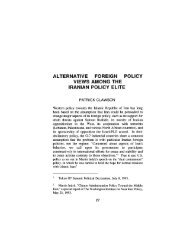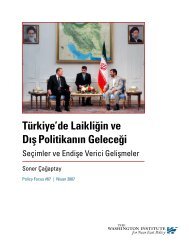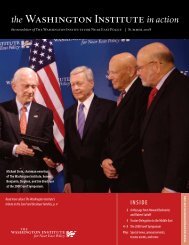Michael Eisenstadt David Pollock How the United States Benefits ...
Michael Eisenstadt David Pollock How the United States Benefits ...
Michael Eisenstadt David Pollock How the United States Benefits ...
You also want an ePaper? Increase the reach of your titles
YUMPU automatically turns print PDFs into web optimized ePapers that Google loves.
ASSET TEST<br />
time [in late 2011] of three joint projects featuring<br />
U.S. start-ups indicates that Israel now offers <strong>the</strong><br />
Americans more than previously.<br />
Israeli companies want access to <strong>the</strong> U.S. market<br />
and worldwide distribution networks, but <strong>the</strong><br />
<strong>United</strong> <strong>States</strong>, too, he continued, can now use<br />
Israeli companies to market internationally, “and<br />
<strong>the</strong> Foundation helps support that.” 18 BIRD, along<br />
with <strong>the</strong> Binational Agricultural R&D Foundation<br />
(BARD) and <strong>the</strong> Binational Science Foundation<br />
(BSF)—three binational foundations created<br />
by <strong>the</strong> U.S. and Israeli governments to spur joint<br />
R&D and funded equally by both governments—<br />
and <strong>the</strong> tax receipts yielded by <strong>the</strong>ir products over<br />
<strong>the</strong> past thirty years have fully repaid <strong>the</strong> U.S. government’s<br />
share. Moreover, those products alone<br />
have generated, by a conservative estimate, direct<br />
and indirect U.S.-based production and global sales<br />
of $5 billion and somewhere between 18,000 and<br />
50,000 jobs for <strong>the</strong> U.S. economy. 19<br />
Despite its small size, Israel is a much soughtafter<br />
partner by local government officials seeking<br />
business opportunities for <strong>the</strong>ir cities and states.<br />
Cornell University recently teamed with Israel’s<br />
Haifa-based Technion as its first international<br />
partner in a new NYC Tech Campus, to serve<br />
as a global magnet for technology talent and<br />
entrepreneurship aimed at transforming New<br />
York into “Silicon City.” NYC Tech is expected<br />
to create six hundred spin-off companies, 30,000<br />
permanent jobs, and $23 billion in economic<br />
activity over <strong>the</strong> next thirty years. 20 Moreover,<br />
top officials from more than fifteen states have<br />
led trade missions to Israel, ten states have<br />
opened trade offices in Israel, and five have signed<br />
agreements to take advantage of Israeli innovation,<br />
involving joint ventures, R&D, and investment,<br />
along with career opportunities in IT, biotech<br />
and medical R&D, defense, and o<strong>the</strong>r fields. 21<br />
Around <strong>the</strong> <strong>United</strong> <strong>States</strong>, Israeli firms from<br />
Teva Pharmaceuticals to Tower Semiconductor<br />
to Strauss food products, among o<strong>the</strong>rs, have<br />
set up major manufacturing plants, with tens of<br />
thousands of employees. 22<br />
For example, Massachusetts hosts nearly one<br />
hundred companies with Israeli founders or Israelilicensed<br />
technologies, which in 2009 employed<br />
nearly six thousand people and generated $2.4<br />
billion in direct revenue for <strong>the</strong> state. 23 In July<br />
201l, <strong>the</strong> two governments formally established<br />
<strong>the</strong> Massachusetts-Israel Innovation Partnership<br />
to reinforce <strong>the</strong>se common endeavors. The state of<br />
Virginia hosts dozens of successful Israeli firms and<br />
licensed product lines; one of <strong>the</strong> newest arrivals,<br />
<strong>the</strong> Sabra agribusiness company, in a joint venture<br />
with Pepsico, plans to double its employment to<br />
almost five hundred American workers within just<br />
its first two years of operation near Richmond.<br />
Its sales have increased more than twenty-fold,<br />
to $250 million annually, since 2005. 24 Two o<strong>the</strong>r<br />
top Israeli firms in very different sectors, Teva<br />
Pharmaceuticals and Zim Shipping Lines, toge<strong>the</strong>r<br />
employ more than a thousand Virginians, with<br />
ano<strong>the</strong>r thousand or so making careers in a wide<br />
range of smaller Israeli companies. 25 And Georgia,<br />
with relatively few ethnic or political links to <strong>the</strong><br />
Jewish state, hosts foreign headquarters of no<br />
fewer than fifty Israeli companies. Many of <strong>the</strong>se<br />
are in biotech and related fields, including Given<br />
Imaging, Mazor Surgical Technologies, Alpha<br />
Omega, and Veritas Venture Partners. 26<br />
In short, while Israel’s overall contribution to<br />
America’s economic strength is relatively modest,<br />
it is often concentrated in sectors that are key to<br />
revitalizing <strong>the</strong> U.S. economy and restoring its<br />
competitiveness overseas.<br />
Cyber/Information Technology<br />
The cyber domain may well be <strong>the</strong> most dynamic,<br />
strategically vital, and promising area of U.S.-Israel<br />
civilian and military cooperation. There are few<br />
areas of modern life that have not been touched by<br />
computers, information technology, and <strong>the</strong> cyber<br />
revolution. Power grids, mass communication,<br />
banking and finance, transportation, and nearly all<br />
economic activity depend on information technology<br />
and computers. With this dependence, however,<br />
comes vulnerability. The reliance of nearly<br />
34 sTraTegic rePorT 7 | eisensTadT, <strong>Pollock</strong>













